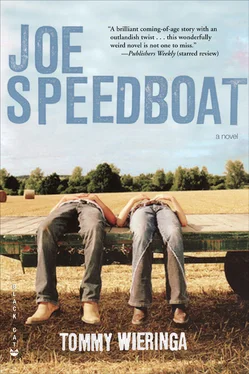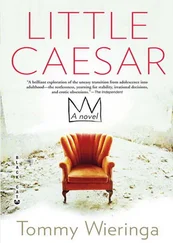I caught a glimmer of an abysmal truth. The people here wanted to pass the time as comfortably as possible, without having to deal with questions that couldn’t be answered with a simple ‘yes’, ‘no’, or ‘I don’t know’. No one around me was doing anything except the best imitation they could of what they’d seen other people do before. Parents imitated their parents, kindergarten teachers other kindergarten teachers, pupils other pupils, and clergymen and educators each other and their books. The only variation was in what they forgot to imitate.
None of them knew the way, rank amateurism was all it was. And I lay awake at night, my eyes wide open, more afraid of the things that weren’t there than of the things that were.
Some people say they were born in the wrong body; I, however, was born not only in the wrong body but also in the wrong family in the wrong village in the wrong country and so on. I read a lot, and in those books I thought I sometimes perceived a shimmer of light. I devoured every book in the Lomark library, except for the large-print section. When I discovered the samurai, I was impressed by their Spartan self-discipline. They at least saw the need, when you had lost your honour and life was rendered meaningless, to stick a knife in your own belly. Seppuku : the clean, straight cut you could never practice, because the first time was also the last. More people should give it a go.
At church I sat in the back pew playing cards, while up in front Nieuwenhuis was saying ‘He that searches for the truth comes to the light,’ but I still couldn’t see a thing.
Nieuwenhuis’s conviction was born of the need to be convinced, that much was clear to me. But exactly what he was convinced of was less clear. Repression was the only thing that could have kept that trap spring-loaded for two thousand years. But now that the internal combustion engine and social democracy had taken some of the tension out of it, you saw repression making way for tolerance and guitars in the church. It was like the way old people who had been real bastards all their life would suddenly break down and weep over nothing when their number was almost up.
Looking back on it, I think I wasn’t even searching for the truth or anything, just for something that shed a little light.
My first year of high school was one huge disaster. It made me sick. Everywhere I looked I saw mediocrity and submissiveness. And an innocence that ruined everything, because it meant no one could really help it. If we were, in fact, the measure of all things, what hope was there of redemption?
By the end of my second year I was furious. A long vacation followed, and I watched July go by. Then August came, and I waited for nothing. I lay on my back in the tall grass that was already turning yellow. The dryness rustled, little bugs crawled over my arms and legs. I let them. Somewhere I heard the pounding of a galloping horse, the corn was still half high and the rust-brown sorrel stuck out above it. I looked up at the blank sky. A lovely blue and all, but otherwise nothing. Growling monotonously, a little plane crossed the void.
At the edges of my vision the woolly thistles were bursting their buds, butterflies fluttered aimlessly and I had the feeling I was sinking. I sank to a dark and quiet place.
It was a day for cyclomowers.
I must have heard it, the tractor pulling the snapping blades, cutting through grass and flowers. Whack whack whack. No sleep so deep but that you would hear that. Who could fail to hear the roar of a 190-horsepower John Deere? Who would lie down and sleep in the grass at mowing time? Who would do something like that? Then you’ve got only yourself to blame.
You’re right, all of you.
Who would lie down in the grass at mowing time?
The front wheel of the tractor crushed my sternum and broke my back, but the blades missed me. The man up on top saw me, but too late. Some call that luck, others misfortune. Musashi says: the Way of the Samurai is the unflinching acceptance of death.
As to what happened afterwards I can only guess. Although I was clearly on my way to the end, sometimes I think I waited — for some reason to come back, a single reason to grasp at a branch along the river of death and start in on the road home, inch by inch, back to where I came from.
Maybe Joe was that reason.
That was a long time ago, and I can’t really get to it anymore, I was too far gone for clear-cut memories. Sometimes it’s so far away that it seems as though I made it all up — the tractor, the dream of the hero, the return to that brighter place.
The memory of my dreamtime.
The body floats just below the surface. There is no pain, no one is missed. Close to the surface, where the light breaks through the water, it is clearer, you can taste the sun.
‘Look,’ someone says, ‘he’s dreaming.’
The hero’s dream. A hero will come, the sound of his heavy footsteps precedes him, those who are outside go in and close the doors; heroes never bring only good fortune. It’s cold, we smell woodsmoke. It tumbles from the chimneys and mixes with the mist that has settled over the fields and roads.
The newcomer whistles a quiet song. He will bring good cheer and sow confusion. He bears new times like a sword. He will shatter our illusions and break through our terse backwardness. His feat will bring beauty, but we will chase him away; this is no time for heroes.
There are hands that lift you up, there are hands that put you down. The body approaches the surface, it has grown lighter, a little lighter all the time. That light, oh hell, it breaks through my forehead like a thermal lance. I am born for the second time. Blind and helpless, I wash ashore. Around my bed they’re talking about Joe.
I’ve learned to shuffle around on thin, crooked legs, always holding onto something with my good arm to keep from falling. I wait, in the little house at the back of the garden, for my parents to die. I live in a rectangle. There is a twin electric hotplate, a microwave oven, a table and a toilet. The bed is behind the table, against the wall. Ma’s the one who put the plants on the windowsill. You don’t have to do much with them, they stay green all the time anyway. At the back I look out on the old cemetery, at the front I see my parents’ kitchen and dining room. At meals they sit with the lamp on above the table; every day The Potato Eaters is called to mind at least once. I eat at my own table, I don’t like being watched. For me, eating consists largely of waiting: waiting for the spasms to go away and then quickly taking a bite. Sometimes that works, other times not, you can’t always feel the tremors coming.
Every morning Ma waves to me from the kitchen across the way. Then she brings Pa his coffee. I don’t have to be there to hear what that sounds like. After breakfast she comes over and helps me dress. I get coffee and a sandwich. When I go out I roll over the tile walkway in the garden to the bike gate, which leads to the street. At lunchtime Ma brings me a warm meal, at night I heat up a pop-top can of hot dogs and eat them with lots of mustard.
Sam built the shelves for my diaries, I like the looks of them. I see order. Artificial order imposed on everything that’s happened.
Every word I write, I write between spasms. During an attack the biro sometimes goes flying through the air.
The inside walls of my house are covered in light-brown plastic panelling with a wood pattern. That’s easy to clean; in the winter the garden house is humid and a speckled mould grows on the walls like barnacles on a ship’s hull.
Dirk has already moved out of the house, he prefers to live alone with his covert filth. Sammie’s only home at the weekends, the rest of the time he stays at a boarding school for young people with learning disabilities. The junkyard is doing well, business there always runs in direct proportion to the general prosperity. Dirk works there full time and someday he’ll take over, although Pa doesn’t seem anywhere near stopping.
Читать дальше












